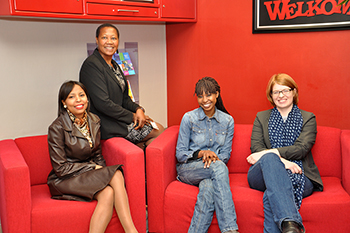Latest News Archive
Please select Category, Year, and then Month to display items
27 October 2025
|
Story Sefako Mokhosoa
|
Photo Supplied
 Ten Grade 12 learners from Mampoi Secondary School in Phuthaditjhaba.
Ten Grade 12 learners from Mampoi Secondary School in Phuthaditjhaba.
On 1 October 2025, the Projects and Innovation Directorate in the Faculty of Education at the University of the Free State (UFS) proudly hosted a certificate ceremony to honour ten Grade 12 learners from Mampoi Secondary School in Phuthaditjhaba on the Qwaqwa Campus. These learners completed a Skills Development Initiative and Workshop Series focused on digital literacy and ICT skills – a programme designed to equip rural youth with the tools they need to thrive in a digital world.
The initiative, which ran from May to August 2025, was made possible through a strategic partnership with BANKSETA to bridge the digital divide in rural communities. The learners received hands-on training in essential digital tools. Each learner also received a tablet to support continued learning and personal growth beyond the classroom.
The Director of the office in the Faculty of Education, Dr Kwazi Magwenzi, stressed that digital skills promote independence and self-directed learning. “Grade 12 is a time when learners should manage their studies, meet deadlines, and explore their options,” she said. “Digital fluency supports that autonomy. It enables learners to use online research, interactive tools, e-learning, and collaboration platforms to make learning more effective, flexible, and aligned with their pace and style. In Grade 12, where the stakes are high – with exams, tertiary entrance, and career choices – this ability helps learners become more self-directed, confident, and equipped.”
The programme not only built learners’ confidence in using ICT tools for learning and communication but also prepared them for the technologically driven environments they will encounter in institutions of higher learning.
Beyond developing digital skills, the project offered learners valuable exposure to the university environment, as their training took place on campus. Inspired by the success of this pilot, the Faculty of Education now aims to expand the initiative to reach more schools and learners across the region. The vision is to scale up access to digital education and empower more young people in rural areas with the skills necessary for academic and professional success.
This ceremony marked the conclusion of a successful training programme and the beginning of a long-term commitment to digital empowerment and lifelong learning in rural communities.
UFS outperforms SA higher education in EU-Saturn programme
2016-12-14

Partnering between the UFS and other institutions
makes it possible for staff and students to study abroad.
Pictured from left front, are: Mareve Biljohn (EU-Saturn
at University of Groningen), Memory Mphaphuli (INSPIRE
at University of Ghent) and Wanda Verster (EU-Saturn at
Uppsala University). Back: Moliehi Mpeli (Erasmus Mundus
at University of Leuven).
Photo: Stephen Collett
The University of the Free State (UFS) strives to invest in its staff and students and a proven example can be seen in the latest cycle of the Erasmus Mundus EU-SATURN programme.
The UFS outperformed the higher education sector over the past five years as it had more exchange scholarships than most South African universities. A total of 16 (18%) out of the 89 local scholarships allocated until 2016 were from UFS. Stellenbosch University, with 14 scholarships, was second.
University one of main roleplayers
Chevon Jacobs, Senior Officer said: “Internationalisation at the UFS is a great achievement as the university allocated all available scholarships to eligible staff and students. She said the strong partnership history between the university and some European institutions, due to a similarity between the language and culture of especially Dutch-speaking countries, is one of the reasons for the success.
“We are very proud of our participation. We have invested for these predominantly young members to spend time abroad in furthering their qualifications,” she said.
The EU-Saturn project has been jointly co-ordinated for the past five years by the University of Groningen, Netherlands, and the UFS.
One of few projects funded by Erasmus Mundus
The Erasmus Mundus is an international partnership aimed at enhancing the quality of European higher education and the promotion of dialogue and understanding between people and cultures through co-operation with other countries. The EUROSA, EU-Saturn, Aesop and INSPIRE to name a few, are all programmes funded by the European Union through the Erasmus Mundus. These projects offer fully funded part-time or full-time postgraduate scholarships for study in Europe.
Some of the universities UFS students have studied at are the University of Groningen, the University of Newcastle, England, and the University of Ghent, Belgium.
Successful UFS grantees awarded scholarships over the past five years:
• Maria Campbell (2014 – PhD) – University of Newcastle
• Sethulego Matebesi (2014 – PhD) – Uppsala University
• Lindie Koorts (2016 – PhD) – University of Groningen
• Reginald Makgoba (2013/2014 – Master’s) – University of Newcastle
• Sanet Steyn (2013/2014 – Master’s) – University of Groningen
• Johnathan Adams (2015/2016 – Master’s) - Göttingen University
• Eben Coetzee (2013/2014 - PhD) – University of Groningen
• André Janse van Rensburg (2013/2014 – PhD) – University of Ghent
• Martin Rossouw (2013-2015 – PhD) – University of Groningen
• Jan Schlebusch (2013-2016 – PhD) – University of Groningen
• Carel Cloete (2014-2016 – PhD) – University of Groningen
• Nadine Lake (2014-2016 – PhD) – Uppsala University
• Elbie Lombard (2014-2016 – PhD) – University of Ghent
• Luyanda Noto (2014/2015 – PhD) – University of Ghent
• Mareve Biljohn (2015/2016 – PhD) – University of Groningen
• Wanda Verster (2015/2016 – PhD) – Uppsala University